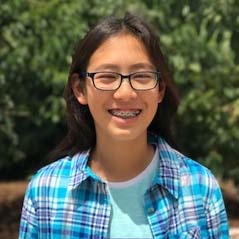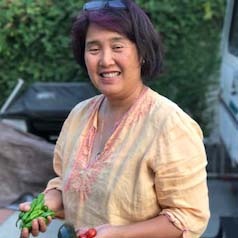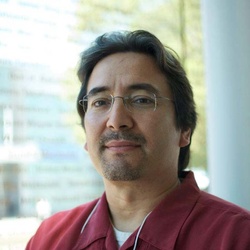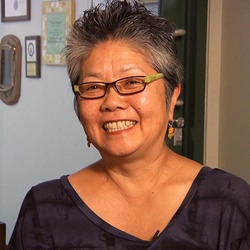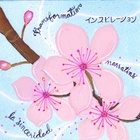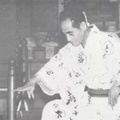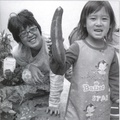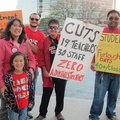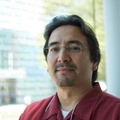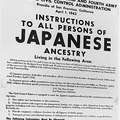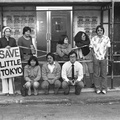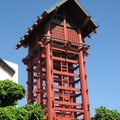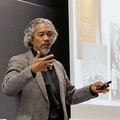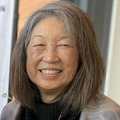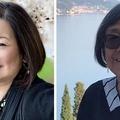For this month’s Nikkei Uncovered, we wave goodbye to the Obon season with special reflections from a family of activist/artists and a local legend & community organizer. Maiya, Jenni, and Tony Kuida-Osumi share with us poems that tie the dance we do in commemoration of ancestors at Obon, with homage in action to community, to our shared struggle, to Los Angeles. Evelyn Yoshimura brings us a brief essay reflecting on the letting go and the images that spring forth through the dance itself. Hopefully these words will not only resonate with the images that come to your mind during Obon, but will inspire those who’ve never attended Obon to do join in next year. Enjoy!
—traci kato-kiriyama
* * * * *
Maiya Kuida-Osumi is a middle school student. She has been playing basketball with the Venice Sparks since kindergarten. She also enjoys playing softball, taiko, and is part of her middle school improv group. Maiya is a member of The Sistahfriends with her friend Tula and has performed at Tuesday Night Café over a dozen times.
Dancing in All Directions
Families young and old
Gather around the yagura
Waiting for the dancing to begin
The kane starts us off
The crowd inches forward
In one fluid motion
I look up
the sun is setting
our ancestor’s lanterns
swaying and
lighting the circle
I look down
the street’s chalk-ridden
I hear the clicking of geta
and the fluttering of kimono
toddlers stagger
under flying happi coats
frantic parents chasing after
I look left
following elders
who lead the way
bachi in hand
we pound the drum
I look right
grandparents lounge in beach chairs
with a front row view
parents on picnic blankets
grandkids on the curb
covered in shave ice
No matter which way
I look
I know
I’m home
We Keep Dancing
Tanko Bushi is like the struggle
we dig, and we dig
we search for communities
in need of support
we offer a helping hand
And when we’re faced with
racism, sexism, militarism,
police brutality, and gentrification
we throw it over our shoulder
and keep dancing
But sometimes, we get tired
so we take a step back
wipe the sweat off our brow
and keep dancing
Even in the toughest of times
we push, and we push
they hold us back
but we keep pushing
And when this struggle ends
we dust off our hands
and keep going
the song is never over
we keep dancing
* The above two poems are copyrighted by Maiya Kuida-Osumi (2017)
* * * * *
Jenni “Emiko” Kuida co-authored the original “101 Ways to Tell if You Are Japanese American” with Tony Osumi. She is currently Grants Manager at Koreatown Youth and Community Center and board member of Japanese American Community Services and Venice Youth Council. Her hobbies include gardening, going to obons, and playing Pokemon Go.
The Best of Obon: Los Angeles
When I think about Obon in LA
and the folks who travel the obon circuit like we do
picking and choosing
where you’ll be on Saturday and Sunday in July
each one different and special,
I think about who has the best teriyaki chicken—gardena
the best shave ice—higashi
the best somen—san fernando
the best corn on the cob—west la
the best butter for the corn—gardena
the best chili rice—higashi
the best yakisoba—gardena valley jci (although technically a summer festival)
the best chinese chicken salad—san fernando
the best imagawayaki, west la, worth the wait
the best dango—venice, with strawberries and cream
the best farmers market—nishi
the best multi-generational taiko—west la
the best white elephant sale—san fernando
the most unique dishes—zenshuji’s takoyaki and ikayaki
the most charming—pasadena, pine trees and old school chow mein says Tony O
the most spiritual, oil lanterns, oshoko, and kinnara—senshin
but food and rankings, a big part of my obon experience
is not what obon is really about, nevertheless
obon fills me with beautiful memories
of hot sticky summers,
my favorite time of year
from my first date with Tony O at west covina,
to starting new traditions with our baby girl,
taking 5 month old Maiya in her first jinbei
to senshin obon back in 2005,
my toddler in a yukata that I hemmed unknowingly
wearing great grandma’s obi,
as a preschooler singing songs about peanut butter, jelly and
Japanese frogs on the nishi center stage,
then at 6 years old doing odori practice
three mornings a week at saishin dojo
able to lead me in the dance,
singing “mottainai” on the yagura with
“auntie nobuko” year after year,
now a tweenager roaming about with friends
in happi coat and flip flops…
and deep down I know that obon is about
honoring our ancestors,
with the lanterns swaying above us,
after 25 years of “religiously” attending obons,
but what stopped me in my tracks this year
and reduced me to tears,
at our neighborhood obon, hearing the names of the
thirteen members of the venice temple family
not the “ancestors,” but regular folks, of all ages,
who were with us last year,
but now
they are dancing in the wind…
—dedicated to joseph tachiki and janet mitsui-brown,
venice hongwanji buddhist temple, 2017
* This poem is copyrighted by Jenni “Emiko” Kuida (2017).
Jenni’s Obon Blog posts can be found here.
* * * * *
Tony Osumi is a Hapa Yonsei who lives in Culver City, CA with his family. Currently, he teaches 3rd grade and is active with Nikkei Progressives and Camp Musubi. He loves searching out old school Cantonese restaurants and ordering homyu and almond duck.
Obon For Our People
Obons visit us
once a year
Like aunties and uncles
bearing gifts
and tight hugs
Every Summer weekend
city streets transformed
tree hung lanterns
booths and banners
and happi coat rainbows
orbit around yaguras
leading and following
our suburban scattered bodies
once set free from restrictive housing
are pulled back
into the warm circle
of community
These taiko beats
call us home
like returning salmon
to dance
both
well-worn ondo steps
carried to America
in memories deeper than
any steamer trunk
and
American-born boogies
conceived in basements
of the Asian American Movement
to the wooing words
of What’s Goin On
and the Yenan Forum
on Literature and Art
Candy colored shave ice
soothes another year
of biting our tongues
in America
Crispy tipped wontons done right
like at Grandma’s New Year’s spread
and in the palm of your hand
warm in translucent white paper bags
under your nose this whole time
the meaning of life—times three
deep fried and powdered
in sugar and cinnamon
If gas and fermenting grass clippings
is the cologne
of the JA experience
then grilled
Teriyaki Chicken á la Obon
is our peoples’ perfume.
Do the hoops and hollers
at the Dough Ball booth
sound like J-Town Saturday night
at the Yamato Club?
A fisherman’s wages
Doubled and lost
with a toss of the dice
Year after year
putting on these carnivals
is a community effort
behind the scenes
hours of prep
institutional memory
ingenuity
dedication
But it’s nothing new
for our people
who crossed the Pacific
grew America’s fruits and vegetables
built 80 Japantowns up and down the Coast
Our people
who survived barbed wire betrayal
Vosges Forest and Leavenworth shrapnel
and still shortened the War
Our people
who organized workers
outlasted McCarthyism
and came home to Serve the People
Our people
who spoke out at Commission hearings
won Redress and Reparations
and stood up with Muslims and Immigrants
Summer obons
These soul healing
safe havens
Ain’t no trouble
for our people
* This poem is copyrighted by Tony Osumi (2017)
* * * * *
Evelyn Yoshimura is the Community Organizing Director at the Little Tokyo Service Center, where she has worked since its beginning in 1980. She also worked at The Rafu Shimpo, Tokyo Kaikan Restaurant, and Amerasia Bookstore. She is married to Bruce Iwasaki and has a daughter, Naomi and son-in-law Casey, who just had a son, Genzo Eiseman.
Mr. Inouye
This year, at the Senshin obon, slowly circling the yagura, dancing in unison to “Obon Odori”—always the first and last dance of the evening, it’s my favorite in it’s simplicity and slowed-down pace, “Ara se-iyo ho ho hoi.”
As the song continued, I found myself in the zone of “just dancing,” no thinking, in synch with the music, other dancers, the Normandie & Exposition neighborhood, the universe. And I thought about Mr. Inouye.
At the Senshin obon, taiko was always played by Mr. Inouye who owned a cleaning business on Jefferson Bl. east of Arlington—a rough area in those days. This was before the “taiko revolution” in the community. Now, there has to be taiko-playing at any gathering of JAs. But in those days, taiko was mainly an obon thing. He was the first person I can remember who played taiko, in his sleeveless white undershirt and worn khaki pants, tenugui tied around his head to catch the sweat, tied the same as the tenugui he wore when he ran the hot clothes press machine at work.
Today, young Taiko players compete to see who plays fastest and loudest, performing for the people watching. Mr. Inouye played “low and slow” as Johnny Mori described it. He never missed a beat. He played to keep the dancers together, to stay connected to the beat of the music, to the dance, to each other.
Slow and low. Connected to each other.
* This essay is copyrighted by Evelyn Yoshimura (2017)
© 2017 Maiya Kuida-Osumi, Jenni "Emiko" Kuida, Tony Osumi, Evelyn Yoshimura






